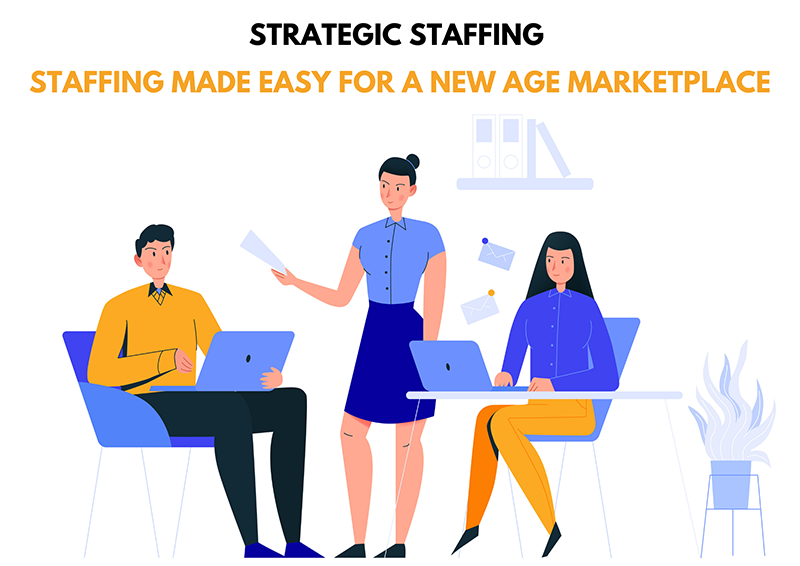[vc_row][vc_column][vc_column_text]Organizations globally have had to rethink hiring and staffing strategies in the wake of the global pandemic and the subsequent relaxation of restrictions. India’s staffing service industry saw a 3.6% growth in the fiscal year 2020-2021, which was driven by a recovery in the fourth quarter of the year 2020. According to data from the Indian Staffing Federation, workers were assisted by the flexi-employment market trends post the pandemic.
The report noted growth in temporary staffing in IT staffing, e-commerce, logistics, and manufacturing. This was irrespective of the impact of the pandemic. Given that most organizations have pivoted to temporary staffing based on their requirements, strategic staffing could be the way forward in a post-pandemic world.
Strategic Staffing
Strategic staffing refers to a human resource strategy where organizations hire a small number of full-time employees and use temporary employees in other highly specific positions and require certain skills. HR managers who take charge of this must ensure that the organization has adequate manpower to meet organizational demands and ensure that performance is not affected.
HR managers must ensure a balance between permanent employees and those who are a part of a strategic staffing initiative. Managers must also have the foresight to have SOPs in place to meet future staffing needs in place and meet their implications if they arise. This process can also be effectively outsourced to a staffing agency
Strategic Staffing – Redefining Paradigms
According to an ASSOCHAM report, the gig sector in India is expected to increase to USD 455 billion at a CAGR of 17% by 2024. Another estimate says India will likely have 350 million gig jobs by the year 2025. Currently, India has a pool of approximately15 a million freelance workers staffed in multiple projects and sectors across IT, HR, and design. The Indian workforce is also growing by approximately 4 million people every year, many of them showing a preference for gig-based contracts and opportunities owing to reasons such as:
- The emergence of start-ups
- The rise of freelancing platforms like Upwork and Truelancer
- The increase in contract hires
- The pandemic
- Shifting lifestyles
This is where strategic staffing becomes advantageous to certain companies looking to fill positions with specific skillsets with contract staffing.
Strategic Staffing Made Easy
If organizations prefer to handle strategic staffing initiatives in-house, here are a few simple steps to get started.
- Identify organizational needs and resources
- Communicate with the HR team regarding requirements and allocation of organizational resources
- Invest in training and development for new hires
Employee retention is a key activity that organizations must follow. This allows organizations to retain employees who were previously hired on a temporary or contract basis and give them positions within the same organization on a permanent basis.
Benefits of Strategic Staffing
- Employee or staff management can be more easily aligned with marketplace changes and requirements.
- Hiring new talent becomes easier, and it also allows for their development for higher and more influential roles within an organization.
- Strategic staffing helps foster a diverse workforce and enables staff or teams to realize their potential.
- The effectiveness of HR services within an organization can be improved with the help of strategic staffing. Outsourcing this function to staffing services can help direct resources previously used by HR to other areas that need improvement.
- Start-ups and smaller companies benefit tremendously from strategic staffing, given their lack of resources and need for employees with specific skill sets and qualifications.
Read more: [ What makes TalentPro a market leader in Contract Staffing? ][/vc_column_text][/vc_column][/vc_row]









